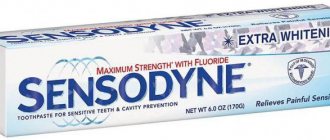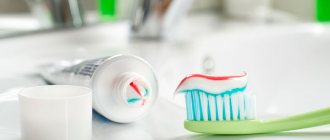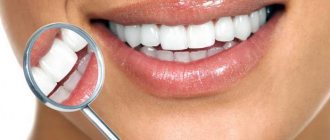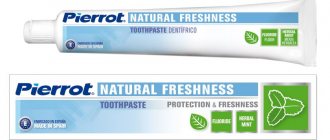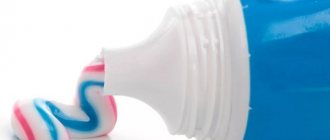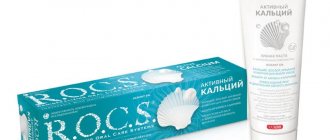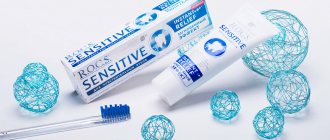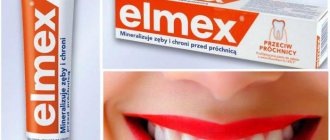From this article you will learn:
- causes of hypersensitivity of human teeth,
- best toothpaste for sensitive teeth,
- analysis of paste compositions, rating 2022.
Toothpaste can act not only as a means for cleaning teeth, but also, thanks to the inclusion of a number of active ingredients, help reduce tooth hypersensitivity, relieve inflammation in the gums, and also help strengthen tooth enamel. With increased tooth sensitivity, pain usually occurs in response to thermal and mechanical stimuli - cold, hot, when touching the teeth with a toothbrush, and sometimes even from sweets.
In most cases, this problem can be solved at home, using special toothpastes for sensitive teeth, as well as by applying gels containing one of the fluoride compounds to the necks of teeth. Pastes and gels from different manufacturers, due to their different compositions, differ in their effectiveness, and in this article we will analyze the composition of the most popular products for relieving hypersensitivity of tooth enamel.
Causes of hypersensitivity development –
First of all, this problem is associated with the thinning of the enamel layer in the area of the necks of the teeth, or with the exposure of the roots of the teeth and the thinning of the “cement” layer located on their surface.
As a result, a deeper layer of tooth tissue is exposed - dentin, which is located immediately under the enamel and cement. Dentin microscopically consists of dentinal tubes in which fluid circulates. If the dentin is not covered with enamel and cement on top, then thermal and other irritants can sharply increase the speed of fluid flow through the dentinal tubules, which ultimately leads to irritation of the nerve endings in the dental pulp and the occurrence of pain. The trigger for the development of pain (in the presence of dentin exposure) can be the consumption of acidic foods and drinks, the use of whitening toothpastes, etc.
6 Mexidol Sensitive
An interesting and effective paste for hyperesthesia. The first thing to remember is that you can use this paste for no more than a month. To determine whether a lift is suitable or not, you need to consult a dentist. It is based on the component Mexidol, which reduces pain more actively than other substances. It also has a long lasting effect. Mexidol increases the resistance of teeth to infections, improves blood circulation and relieves inflammation. The composition also contains xylitol, which stabilizes the acid-base balance of the oral cavity.
The main effect of the paste is to restore weakened or damaged enamel. The second feature is the lowest abrasiveness. There will be minimal damage to your teeth during brushing and little to no wear will be caused to your teeth. The main effect of the drug occurs due to the analgesic effect of components that affect nerve fibers. Therefore, the effect can be noticed almost immediately. The paste can be used not only for cleaning, but also for application to dental tissues with which problems arise. It is worth remembering that the product is not recommended for children under 12 years of age and pregnant women.
How to choose a toothpaste for sensitive teeth -
Toothpastes for relieving tooth sensitivity (hypersthesia) have specific characteristics. Firstly, toothpaste for sensitive teeth usually has a fairly low abrasiveness within the RDA range of 25 to 35 (RDA - abrasiveness index). For example, for ordinary therapeutic and prophylactic toothpastes the RDA index is 75, and for whitening pastes it is usually 100-120.
The second important point to pay attention to is the active components. Different manufacturers use ingredients that are different from each other, which have different mechanisms for reducing tooth sensitivity, and as a result, have different effectiveness and different speed of onset of effect. Based on the mechanism of action, the following groups of components can be distinguished...
Active components in toothpastes for sensitive teeth -
- Potassium nitrate, potassium chloride - these components block the transmission of nerve impulses.
The transmission of nerve impulses is based on the exchange of potassium ions (located inside nerve cells) with sodium ions located outside the nerve. By increasing the concentration of potassium ions around the nerve endings, we disrupt this exchange, which leads to the absence of pain in the teeth - in response to thermal and mechanical stimuli. The advantage of these components is that the effect of their use develops very quickly. However, the result will last as long as you use them. Thus, potassium nitrate and chloride can quickly relieve pain, but they do not eliminate the very cause of hyperesthesia.
- Fluorides, strontium chloride, zinc citrate, hydroxyapatite - these components affect precisely the cause of the development of dental hypersensitivity - the accelerated movement of fluid in the dentinal tubules, which leads to irritation of the nerve endings.
Fluoride compounds (sodium fluoride, aminofluoride, monofluorophosphate), strontium chloride, zinc citrate, hydroxyapatite - all of them clog the dentinal tubules, preventing the movement of fluid in them. In addition, strontium chloride also promotes the deposition of replacement dentin and the compaction of its structure, which also helps reduce hypersensitivity. However, the downside of all these components is that the effect from their use develops more slowly than from the use of potassium nitrate or potassium chloride.
- Arginine and calcium carbonate combination - a combination of Arginine (an amino acid) and calcium carbonate in toothpaste - is also very effective in treating dental hypersensitivity.
Arginine facilitates the deposition of a layer of calcium carbonate on the surface of the teeth, which in turn stimulates the deposition of phosphates on the surface of exposed dentin and in the dentinal tubules, contributing to their clogging and reducing the movement of fluid in them. However, although it reduces sensitivity well, it does not solve the problem of demineralization of enamel and dentin. It should be noted here that the layer of calcium carbonate with arginine will be inactive, and calcium from this layer will not penetrate into the hard tissues of the teeth. This distinguishes arginine carbonate pastes from pastes with fluorides, after the use of which an active layer of calcium fluoride (CaF2) is created on the tooth surface. In addition to the fact that CaF2 also clogs the dentinal tubules on the surface of exposed dentin, calcium and fluoride from this layer are able to penetrate into the hard tissues of the teeth, strengthening them.
Conclusions -
Precisely because some components are capable of providing an immediate effect, while others (although their effect develops slowly, they eliminate precisely the cause of pain) - most toothpastes for sensitivity are made with a combined composition. Where potassium nitrate quickly relieves pain, and fluorides, hydroxyapatite, strontium chloride, or a combination of arginine and calcium carbonate clog exposed dentinal tubules.
However, there are also effective monocomponent products for use at home. Such products contain a very high concentration, usually of only one component, for example, potassium nitrate or sodium fluoride. In this way, they resemble professional means for reducing sensitivity that dentists use in their work. Examples of such gels are PRESIDENT Sensitive Plus and Colgate® Duraphat. How they can help you - read below.
Which desensitization paste to choose for a child?
The delicate enamel of baby teeth requires special delicate care. Children's toothpaste should not contain SLS, parabens, or titanium dioxide. If the paste foams a lot, it means that it contains SLS, and it is better to discard it.
It is important that the amount of abrasives is minimal (RDA - from 0 to 20).
Children's toothpaste should contain a small amount of fluoride: up to 4 years - 200 ppm, from 4 to 8 years - 500 ppm.
It is very important that the paste is not only effective and safe, but also tasty. This will help your baby learn to brush their teeth regularly.
Toothbrushes for sensitive teeth –
In cases where the touch of the toothbrush bristles to the necks of the teeth causes pain and discomfort, it is recommended to use special toothbrushes with soft bristles when brushing your teeth. These brushes are marked “Soft”. They also differ from ordinary toothbrushes in that each bristle has a rounded or very thin atraumatic tip.
Price for toothbrushes for sensitive teeth –
- SENSODYNE Sensitive toothbrush – from 160 rubles,
- LACALUT Sensitive toothbrush – from 190 rubles.
Important: use this brush only in cases where pain occurs when touching your teeth with a regular toothbrush. They cannot be used on an ongoing basis, because... Brushes with soft bristles remove microbial plaque from teeth much worse than brushes with medium hardness, and therefore, with prolonged use, plaque and tartar may accumulate on the teeth.
3 Sensodyne With fluoride
One of the toothpastes known for quite a long time. Over the years of its existence, it has repeatedly confirmed its quality and reliability. The paste, like others in the rating, is intended for sensitive teeth. But it is especially recommended in the presence of crowns, as it promotes the remineralization of teeth. The effect of this paste is based on deep penetration into the dentin layers. It affects the channels inside. Thanks to this, the susceptibility of the nerve fibers decreases, and the pain becomes less and eventually disappears completely.
The composition includes potassium nitrate and fluoride. They make teeth stronger and remove inflammation. This paste is used both for treatment and to prevent excess sensitivity. In the second case, you can use it in the morning and use regular paste in the evening. It is also important to use it with soft bristles on the brush. Since medium or high hardness bristles can damage the tooth and cause unnecessary problems. Dentists recommend using this toothpaste only after reaching 12 years of age. It can do more harm to the child than good. In general, user reviews praise the paste - some were advised by a doctor, others found it themselves. In any case, the effect was not long in coming.
Lacalut Extra Sensitive
Such toothpastes are very popular for reducing tooth sensitivity. Its main advantage is action in several directions simultaneously.
- The mixture blocks nerve endings, which reduces pain.
- The product saturates the enamel structures with useful elements.
After use, the surface of the crowns is covered with a protective film, which remains on the chewing organs for several hours. This helps fluoride penetrate deep into the enamel. Vulnerability quickly normalizes, and the risk of developing caries decreases. In addition to the optimal fluoride content, this paste is saturated with many beneficial minerals. Among them are potassium and sodium fluoride. The composition is selected to reduce hyperesthesia.
ROCS Sensitive
Dentists advise some patients to undergo ultrasonic teeth cleaning. This is a modern procedure, after which the patient must carefully care for the oral cavity using a special product. For those clients who suffer from allergies, it is often recommended to use ROCS Sensitive as there is no fluoride in the mixture. The product is suitable for patients who do not have a deficiency of this element in the body. The abrasiveness of this product is lower than that of many daily hygiene products. This means that the abrasion of the enamel will be minimal, the crowns and dentin will not be injured. With this care, incisors, canines, and molars will look beautiful, without carious damage. The composition of the paste quickly normalizes the microflora of the oral cavity.
Calcium glycerophosphate restores the structure of the chewing organs well and saturates the crowns with useful minerals. Hyperemia is quickly eliminated with the help of hydroxyapatite particles. All defects on the crowns are instantly sealed. Xylitol and magnesium have a beneficial effect on enamel.
New Pearl Calcium
This paste is universal. The whole family can use it. It is allowed for children from the age of three. The mixture has a preventive and therapeutic effect. If units react slightly to heat and cold, this product will eliminate such unpleasant sensations. The product strengthens the enamel well and reduces the vulnerability of the enamel. The mixture contains a large amount of calcium. It saturates the enamel with useful minerals. The paste contains potassium and fluorine. It is released slowly, so there will be no immediate effect. The substance acts gradually, gently.
